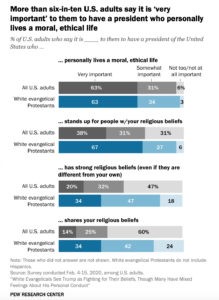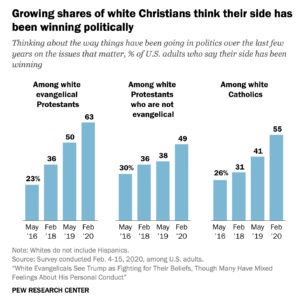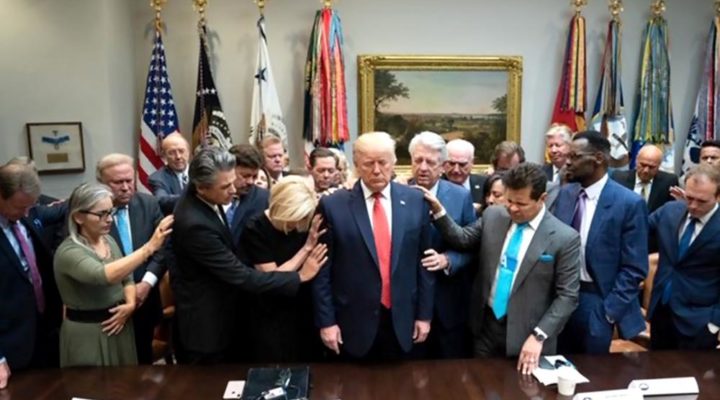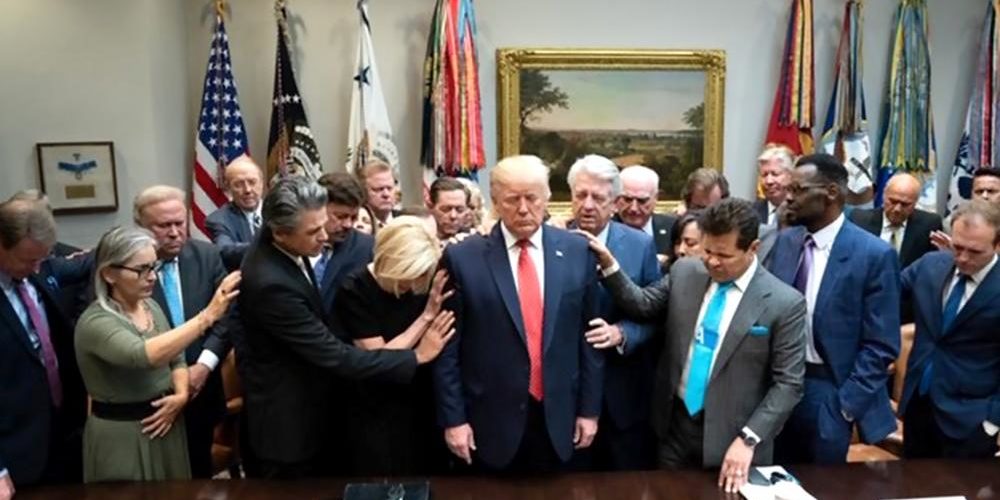Recent surveys show Americans care more about having a “moral, ethical president” than about having a religious president. And although only 32% of Americans describe Donald Trump as “morally upstanding,” 61% of white evangelicals say that term describes Trump.
Meanwhile, more Americans than ever say it is not necessary to believe in God in order to be moral and have good values.
Both findings come from recent surveys reported by the Pew Research Center, and both reflect the growing chasm between white evangelical Christians and the rest of the nation. Both surveys were conducted before the police murder of George Floyd in Minneapolis and the subsequent reckoning on racial issues and before the arrival of coronavirus.
The latest installment of a multiyear survey on global religious trends finds a 14-point increase in the percentage of Americans who agree with the statement, “It is not necessary to believe in God in order to be moral and have good values.” In 2002, only 40% of Americans believed this statement; today, 54% affirm it as true.
In the U.S., Protestant Christians collectively affirm a morality rooted in belief in God, with 63% saying this is true. That compares to 52% of Catholics and 14% of the religiously affiliated.
Globally, connecting belief in God with morality ranks highest among Muslims and among Christians in South America.
 Set against this global backdrop, and with a U.S. presidential election months away, Pew asked Americans how important it is to have a president who is “moral” and “ethical.” Among all U.S. adults, 64% said it is “very important” for a president to “personally live a moral, ethical life.” Another 31% said this is “somewhat important.”
Set against this global backdrop, and with a U.S. presidential election months away, Pew asked Americans how important it is to have a president who is “moral” and “ethical.” Among all U.S. adults, 64% said it is “very important” for a president to “personally live a moral, ethical life.” Another 31% said this is “somewhat important.”
That compares to about half the general population who believe it is at least “somewhat important” to have a president who is religious, although only 20% said this is “very important.”
Democrats were more likely than Republicans to say the personal morality and ethical behavior of a president matters. Among Democrats, 71% said this is “very important,” compared to 53% of Republicans.
However, Republicans were nearly three times more likely than Democrats to say it is important that a president share their own religious beliefs.
White evangelical Christians top the chart on seeing Trump as at least “somewhat religious,” a view held by 64% of this group, compared to only 35% of all Americans. Within that group, only 12% of white evangelicals believe Trump is “very religious.”
Pew Center research also discovered that while white evangelical Protestants may not see Trump as “moral and ethical,” they believe their own views of the world are “winning” with Trump’s leadership.
 In this latest survey, 83% of white evangelicals identified with the Republican Party, which could be one factor in believing their side is winning. Other polling indicates that Trump’s policies — such as restrictions on immigration and attempts to preserve Confederate monuments — play a role in this assessment too.
In this latest survey, 83% of white evangelicals identified with the Republican Party, which could be one factor in believing their side is winning. Other polling indicates that Trump’s policies — such as restrictions on immigration and attempts to preserve Confederate monuments — play a role in this assessment too.
Notably, the percentage of white evangelical Protestants who believe their views are winning has nearly tripled since May 2016, when Barak Obama was president. Support for this view among evangelicals has been steadily rising each year of the Trump presidency, growing from 23% in 2016 to 63% this year.
A similar trend has occurred among white Catholics.
This view of “winning” under Trump’s leadership comes as two-thirds of white evangelicals believe Christianity’s cultural influence is waning. Similarly, two-thirds of white evangelicals believe there is conflict between their beliefs and “mainstream American culture” today.
In one final twist of irony in the polling, Trump — who famously accused Obama of being a Muslim when he was instead a practicing Christian — defies religious labeling by most Americans. Pew Center data found one-third of Americans aren’t sure what Trump’s religion is. Only 44% think he’s Christian.


